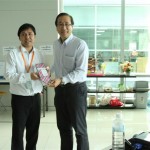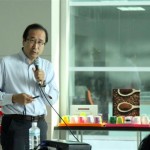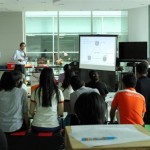Prof. Susumu Kitagawa and his research team at Institute for Integrated Cell-Material Sciences (WPI-iCeMS), Kyoto University, Japan, was the first to synthesize a novel PCP/MOF with permanent porosity, capable of storing supercritical gases such as CH4, O2 and N2 at ambient temperature. This epoch-making discovery inspired researchers worldwide to synthesized gas storage materials from PCPs with a higher capacity than conventional materials.
Prof. Susumu was recently in the country to give a talk at PACCON 2014 in Khon Kaen. NANOTEC invited Prof. Susumu to visit NANOTEC and present a talk on “Chemistry and application of porous coordination polymers (PCPs)/metal organic frameworks (MOFs)”.
According to Prof. Susumu, Porous Coordination Polymers (PCPs) or Metal-Organic Frameworks (MOFs) are an emerging class of microporous solids combining the modularity of inorganic structural building units (nodes) with organic ligands (linkers) that can be tailored through organic synthesis. He went on to say that this particular combination of designability and the structural porosity of PCPs has led to explosive growth in their application to gas storage/separation, catalysis, ion conductivity, chemical sensing, and drug delivery systems. Today several hundred different MOFs are known, and over 2,000 articles on this class of materials are published annually worldwide.
Dr. Kajornsak Faungnawakij Senior Researcher/Team Leader at Nanomaterials for Energy and Catalysis Lab at NANOTEC presented a Nano Tie with water-repellent and anti-bacteria properties as a token of appreciation to Prof. Susumu.


